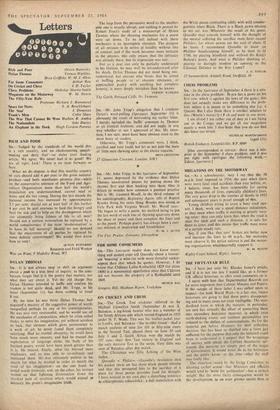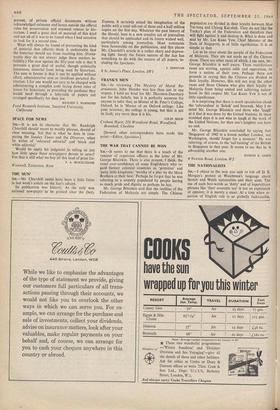THE FIFTY-YEAR RULE
SIR.—I have just seen Mr. Rhodes James's article, and if it is not too late I. would like, as a fOrmer UK official historian, to offer some comments on it.
1 agree with him that Departmental Records arc far more important than Cabinet Minutes and Papers. If the sample of these latter I was called upon to inspect--for both World Wars—is a fair one, future historians are going to find them pretty disappoint- ing and in many cases not even intelligible. The stan- dardised form in which the minutes, in particular, are cast has virtually the effect of converting them into secondary .historical material, in which even earth-shaking events and lambent personalities arc reduced to the dullest of commonplaces. As for the material put before Ministers for their collective decision, this has been so distilled into a form just sufficient for the purpose that only the initiated could hope to understand it. I suspect that the wrappings of secrecy with which the Cabinet Secretariat sur- rounds this material are simply part of the magic of Government. It would never do to let historians and the public know at the time--what the stuff was really like. The objection raised by the Grigg Conuitittee to allowing earlier access—that Ministers and officials would tend to 'write for publication'—has a certain weight. But the more likely consequence would be the development, to an even greater extent than at present, of private official documents without acknowledged existence and hence outside the official rules for preservation and eventual release to his- torians. I used a great deal of material of this kind and not all of it was to be found when I had occasion to look for it a second time.
Ways will always be found of preventing the kind of material that officials think it undesirable that the historian should see from reaching him. (Fortu- nately they do not always judge these matters in- fallibly.) The case against the fifty-year rule is that it prevents a great deal of useful, though politically innocuous, material from being used by historians. The case in favour is that it can be applied without effort, administrative cost or invidious personal dis- tinction. I for one would not care to be charged with administering a complex code laying down rules of access for historians, or providing the guidance they would need through a labyrinth of papers not arranged specifically for their use.
RICHARD HAMMOND RICHARD HAMMOND
Food Research Institute, Stanford University, California





























 Previous page
Previous page